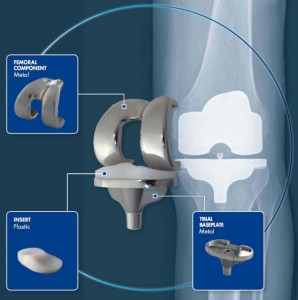Total knee replacement surgery replaces damaged bone and cartilage with a prosthetic knee made of metal (cobalt chrome) and polyethylene plastic. It is most commonly performed for arthritis. The artificial joint is attached to the bones using surgical cement.

Do I need a Knee Replacement?
The right time to have a knee replacement is when the pain and stiffness in the knee has reached a stage when it is causing you bother on an almost daily basis and interfering with you participating in the activities you enjoy. For some this means they can no longer complete a round of golf and they are not prepared to quit playing. Others may have difficulty working or even walking short distances with their dog or to the shops. Some might put surgery off until they have difficulty hobbling to the bathroom. Most patients go through a long period of considering the surgery before ever seeing a surgeon. There is no single right answer. I advise my patients to take their time, consider the impact their knee is having on their enjoyment of life and discuss with them the potential benefits and risks of the surgery.
Success Rate of Knee Replacement Surgery
The goal of a knee replacement is to achieve a “forgotten joint”: that is for the patient to be able to comfortably go about their life and not be constantly aware they have an artificial knee. 90% of people have a dramatic reduction in pain and a significant improvement in their mobility and activity. Depending upon their general fitness, patients are often able to resume golf, leisurely tennis or extended bush walks.
How long the knee will last depends on the patients age (younger more active patients will wear quicker), weight and activity level.
According to the Australian Joint Replacement Registry the chance of a knee replacement performed for osteoarthritis lasting 15 years is 92.7%. With improvements in design and materials in the last 15 years it is hoped that this figure will improve.
Recovery from Knee Replacement Surgery
A knee replacement is a significant operation and recovery takes place over a course of months. Patients are in hospital for 3-5 days and less sprightly patients may require a period of rehabilitation prior to returning home. The knee will be swollen and the swelling settles over 4-8 weeks. Crutches or a walking stick may be required for up to 6 weeks. It is important to resume walking early – the day after the operation – to reduce the risk of blood clots or chest infection. Early physiotherapy aimed at regaining movement is also important – as a stiff knee a couple of months after surgery is unlikely to get moving.